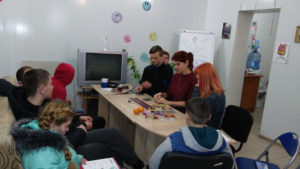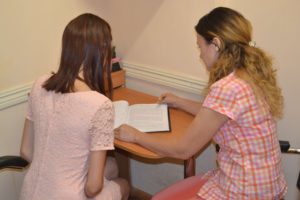 In 2011-2017, over eight thousand clients received 70,232 medical, psychological, social and legal services within ‘Bridging the Gaps: Health and Rights for Key Populations’ project in Ukraine. Halyna, Artem and Carl (names changed) were also clients of ‘Bridging the Gaps: Health and Rights for Key Populations’ project.
In 2011-2017, over eight thousand clients received 70,232 medical, psychological, social and legal services within ‘Bridging the Gaps: Health and Rights for Key Populations’ project in Ukraine. Halyna, Artem and Carl (names changed) were also clients of ‘Bridging the Gaps: Health and Rights for Key Populations’ project.
Resolving problems with the family
Halyna is 19 years old. She is a slim girl with beautiful eyes and a charming smile. Halyna was born in a small Ukrainian town bordering with Moldova. She has been living with a man she loves for a year. A month ago, they got married.
However, just two years ago, Halyna’s life was neither easy nor happy. Back then, she lived with her mother and stepfather and was a constant victim of abuse. Halyna’s stepfather did not want the girl to live with them, so was turning his wife against her own daughter. Halyna, who was still a minor, had to leave her home, find a job and make her own living. The girl started using drugs – first marijuana, then amphetamine, sometimes ecstasy or LSD. It lasted for a few months.
Once, when the girl told her mother everything. Talking about that period of her life, Halyna cannot hold her tears back.
“When I came back home, I was not quite adequate and had hysterics. Once, my stepfather called police and they took me away. They sent me to a juvenile shelter in Chernivtsi. I spent two months there. At first, it was difficult, and I wanted out of there as soon as possible, but when I went back home to my family, it was even worse. My stepfather abused me and made my mother do the same,” tells the girl.
The psychologist working in the shelter referred Halyna to the Dialogue Centre of Social and Psychological Support (New Family Foundation), implementing ‘Bridging the Gaps: Health and Rights for Key Populations’ project. Three times a week, Halyna attended counselling sessions with a psychologist and a social worker there. Besides, the girl, her mother and stepfather took part in family group conferences. The approach of family group conferences stipulates that a child may not be viewed separately from the family, so family members should be involved in solving child’s problems. Halyna says that it helped to maintain relations in her family for a while.
“Later, as my legal age was approaching, my mother and stepfather said that they did not want me to live with them. Our problems resumed, and I went back to drugs. After I turned 18, I had to move out,” tells the girl.
Despite the challenges, Halyna continued coming to the Centre for support and soon was able to quit drugs. She attended the Centre for about eight months. The girl says that for her, the Centre was a safe place and people working there helped her a lot. Halyna thinks that it is quite possible that if not for this support, she would still be using drugs.
Coming home for Mom’s birthday
Artem from Kropyvnytskyi is 22. He lives with his family – his parents, sister and grandmother. The young man says that he likes mountains, nature, rock-climbing and drugs.
When Artem was a teenager, he started taking alcohol, smoking cigarettes and then tried drugs for the first time. He confesses that he was not happy with his life and wanted to escape the reality, so he started “systematically” using drugs. Crystal meth, LSD, ecstasy and so on – he used everything except injecting drugs. It lasted for over four years.
Then his family intervened. Artem’s uncle suggested he should visit a psychologist from Lilia social bureau (NGO Return to Life). Psychologist’s counselling, awareness-raising classes, school of volunteers – all those things became part of the young man’s life.
However, just in several months he went back to drugs and had to start everything from scratch. Later, Artem spent three months in the rehabilitation centre run by the Return to Life NGO. He came back home last autumn, on his mother’s birthday.
“If it were not for this project and the social bureau, I would probably still be an active drug user. Maybe I would even end up in jail,” says Artem.
He became an active volunteer of the organization. Campaigns, workshops, summer school, working on his own project – all those things interest him and are an important part of his life. He has no desire to go back to drugs.
Drugs bring an illusion of the solution
 Nineteen-year-old Carl is a second-year psychology student from the western region of Ukraine. He has parents and an older sister. Carl enjoys learning new things and likes history, especially military history. A year ago, he experienced some problems and his friends offered him a “way out” – together with them, he started using drugs.
Nineteen-year-old Carl is a second-year psychology student from the western region of Ukraine. He has parents and an older sister. Carl enjoys learning new things and likes history, especially military history. A year ago, he experienced some problems and his friends offered him a “way out” – together with them, he started using drugs.
“At first, I liked it, it felt exciting. Then I realized that drugs only bring me new problems. I grew addicted to drugs, could not communicate with people in a normal way, it interfered with my studies. When I understood that it all turns out to be a problem, I came to the Centre,” says Carl.
He heard about the Dialogue Centre a year and a half ago. Project workers regularly come to student dormitories and tell young people about HIV, drugs, safe sex, test them for HIV and hepatitis, distribute condoms.
“I lost many friends and acquaintances. Sometimes even my fellow students rejected me and called me a drug addict. I am a human, so when the society turns its back on me, it is very painful,” he recalls.
In the Centre, there was a psychologist who worked with Carl for six months. Embarrassed, Carl tells that he opened up during those counselling sessions and even cried. He says that the psychologist helped him to keep his life from going to pieces. Besides, in the Centre he could eat a meal and spend his leisure time.
“I know for sure what would happen to me if not for this Centre and this project. There was a friend of mine in the dormitory, who had a “point of no return”: he switched to hard injecting drugs, was kicked out of the dormitory and then – out of the university. It is quite probable that it would be the same with me,” says Carl.
The problems, which led the young man to drug use, are still there, but he realized that drugs do not resolve them, only bringing an illusion of solution. He is sure that every person should understand it.
About the project
‘Bridging the Gaps: Health and Rights for Key Populations’ is an international project, which was launched in Ukraine in 2011 and is aimed at protecting the human rights of drug users by changing social attitudes and government policies and improving the services they can access. The main activities are aimed at under-age drug users. Four partner organizations provide services to adolescents in four cities: Return to Life CF in Kropyvnytskyi, Public Health PRCF in Poltava, Blago CF in Kharkiv and New Family CF in Chernivtsi.
In Chernivtsi, there is a rehabilitation centre, while in other cities the services are provided through social bureaus and day care centres. The efforts are aimed at reducing the risks of drug use, re-establishing social connections and finding resources in the lives of adolescents to support them. The most important task for project workers is to make adolescents understand that in the centres they will be welcomed and will not be judged because of their drug habits.



